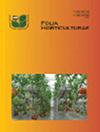芋头的生长与产量使用不同的种植材料和暴露于不同形态改变处理的Schott)
IF 1.8
4区 农林科学
Q2 HORTICULTURE
引用次数: 0
摘要
摘要本研究旨在比较球茎和吸盘,以确定更好的种植材料(PM),并评估形态改变处理对芋头植株芽生长和球茎产量的影响。使用的PM包括球茎(PMC)、两片叶子的吸盘(PMS2)和四片叶子的吸管(PMS4)。形态改变(MA)处理包括去除所有吸盘(MAS)、切除母株(MAM)和未处理对照(NMA)。每周收集数据进行非破坏性测量,并在种植后12、20和28周收集数据(WAP)进行破坏性测量。本研究的结果表明,使用球茎和形态未改变的植物生长的芋头植物的SPAD值较高。去除所有吸盘使母株的叶片数量增加。球茎膨大后,母株叶片、叶柄和须根的干重和吸盘数量减少。球茎的鲜重和干重在20WAP时增加,然后在28WAP时减慢。球茎的水分含量相对稳定在75%。球茎可以在须根和吸盘上形成,但如果定期去除吸盘,球茎的总湿重和干重会降低。当母株被切除时,与NMA植物相比,吸盘的生长非常显著。同时,如果去除所有吸盘,母株的生长与NMA植物的生长相对可比。本文章由计算机程序翻译,如有差异,请以英文原文为准。
Growth and yield in taro (Colocasia esculenta (L.) Schott) grown using different planting materials and exposed to different morphological alteration treatments
Abstract This study aimed to compare cormels and suckers to determine the better planting material (PM) and to evaluate the effects of morphology-altering treatments on both shoot growth and corm yield in taro plants. The PMs used included cormel (PMC), suckers with two leaves (PMS2) and suckers with four leaves (PMS4). Morphological alteration (MA) treatment included removal of all suckers (MAS), excising the mother plant (MAM), and non-treated control (NMA). Data were collected weekly for non-destructive and at 12, 20, and 28 weeks after planting (WAP) for destructive measurements. Results of this study indicated that the SPAD values were higher in taro plants grown using cormel and morphologically non-altered plants. Removal of all suckers caused the mother plant to increase the number of leaves. The dry weight of the leaf blades, petioles and fibrous roots of the mother plant and the number of suckers decreased after the corm enlargement process took place. Fresh and dry weights of the corm increased at 20 WAP and then slowed down at 28 WAP. The moisture content of corm was relatively constant at 75%. Cormel could form on the fibrous roots and on suckers, but the total wet and dry weights of the cormels were decreased if the suckers were periodically removed. The growth of suckers was very dominant compared to the NMA plant when the mother plant was excised. Meanwhile, if all the suckers were removed, the growth of the mother plant was relatively comparable to that of the NMA plants.
求助全文
通过发布文献求助,成功后即可免费获取论文全文。
去求助
来源期刊

Folia Horticulturae
Agricultural and Biological Sciences-Horticulture
CiteScore
3.40
自引率
0.00%
发文量
13
审稿时长
16 weeks
期刊介绍:
Folia Horticulturae is an international, scientific journal published in English. It covers a broad research spectrum of aspects related to horticultural science that are of interest to a wide scientific community and have an impact on progress in both basic and applied research carried out with the use of horticultural crops and their products. The journal’s aim is to disseminate recent findings and serve as a forum for presenting views as well as for discussing important problems and prospects of modern horticulture, particularly in relation to sustainable production of high yield and quality of horticultural products, including their impact on human health.
 求助内容:
求助内容: 应助结果提醒方式:
应助结果提醒方式:


